It took five months after I shared this tweet with our Oklahoma State Superintendent of Public Instruction, Janet Barresi, but it’s done.
Thanks to a tweet this evening from Shawn Blankenship, I learned Oklahoma has officially withdrawn from PARCC, one of two consortia putting together high-stakes tests for the Common Core State Standards. According to a July 3 article in the Tulsa World:
Using new assessments developed through a consortium of 20 or so other states called the Partnership for Assessment of Readiness for College and Careers, or PARCC, was one of Barresi’s first major decisions upon taking office in January 2011.
But on Monday, Barresi reversed herself, saying she was heeding widespread concerns about additional test-taking hours that would be involved in PARCC assessments, along with her own about the technological readiness of state public schools and higher anticipated costs.
A recent state survey found that only 33 percent of school sites in Oklahoma are technologically prepared for PARCC testing.
And Barresi claims that the vast majority of technical problems public schools across the state experienced with testing this spring were proof that Oklahoma does not yet have the capacity for the volume of online testing required for PARCC tests.
The article goes on to detail how Tulsa Public Schools’ superintendent Keith Ballard feels the decision inaccurately blames Oklahoma schools for last year’s testing fiascos, instead of the vendor, CTB McGraw-Hill. Article author Andrea Eger wrote:
“It’s shocking that she [Barresi] is placing the blame on schools. She had everything to do with the selection of this vendor, and now she is protecting the vendor by saying it’s the schools’ fault,” Tulsa Superintendent Keith Ballard said.
He said Barresi’s reversal on PARCC assessments smacks of “political grand-standing,” given the fact that she has just begun campaigning for re-election.
“I find this whole getting out of PARCC perplexing. While I have said there’s too much time spent on assessments and I am not in favor, necessarily, that we stay in PARCC, I support Common Core, and I don’t see this abrupt move resolving anything,” Ballard said.
“I see little real leadership being shown because there is no thought given to where does that leave us.”
I definitely agree with Ballard that the lion’s share of the blame for Oklahoma educational testing follies this past spring was the fault of CTB McGraw-Hill. It’s also true, however, that the educational technology capacity of many Oklahoma school districts is VERY poor. The demands of online testing are greater than many Oklahoma schools can presently meet.
Here’s the CRITICAL idea to take away from this discussion, however: We should NOT be purchasing educational technology hardware in Oklahoma, or any other state in our nation, simply to test students online and raise test scores. Read my August 2006 post, “1:1 projects, test scores, and sea change,” for more details on this. Here’s the summary: TESTING STUDENTS ONLINE IS THE WRONG REASON TO GO 1:1, or to buy educational technology of any stripe. Mobile computing devices in the hands of students and teachers have the capacity to serve as bridges to creativity and become imagination machines. Yes we need to embrace blended learning and provide mobile devices to all students as well as teachers in Oklahoma, but the reasons we should do this do NOT include high stakes testing. This is essential to understand.
Although I started out this post with a screenshot of a Tweet I shared with Janet Barresi in February, I certainly do not take any of the credit for this recent decision for Oklahoma to withdraw from PARCC. I AM, however, VERY supportive of this decision by Barresi and hope we will continue to see a statewide political move AWAY from high stakes testing as the primary (and counterproductive) means to improve educational opportunities for students and teachers in our state.
You can search my Tweet Nest archive for “JanetBarresi” to see what other advocacy ideas I’ve shared with her over social media in the past years. My advocacy on these issues has been both consistent and vocal.
For additional reading on how we, as Oklahomans, need to REDIRECT our political efforts to improve schools away from high stakes testing, please read these past posts:
- Speaking Out Against Common Core High Stakes Testing & Corporate Driven Education Reform (April 2013)
- Oklahomans Against High Stakes Testing Worship (March 2012)
- Standardized Test Results Obfuscate Real Learning (December 2011)
- NCLB Fulfilling Mission to Portray All Public Schools as Failing (October 2011)
- Understanding and OPPOSING Misdirected Educational Reform Efforts (August 2011)
- High Stakes Testing Must End in the USA (March 2011)
- New Oklahoma Leaders Mistakenly Think Testing Focus Key to Educational Improvement (November 2010)
- No alternative to the RTTT / Duncan Education Reform Plan Offered by [Oklahoma Governor Mary] Fallin (December 2010)
- NCLB High Stakes Testing is Counterproductive and Bad for our Nation (October 2010)
- NCLB damages US education by narrowing the curriculum (June 2010)
- NCLB has killed creative teaching and energetic learning about science (at least before state testing) (May 2010)
- NCLB was designed to define public schools as failures (May 2010)
- We must re-imagine our school cultures and end the madness of high stakes testing / standards-based reform (November 2008)
- ReadingFirst, NCLB, School Accountability, and our Educational Future (August 2008)
- A contrary view of education and NCLB (February 2008)
- NCLB, local control, end of course exams, and educating shepherds instead of sheep (January 2007)
I’m convinced we need a non-partisan gameplan to change our toxic educational culture, which has been nationally focused on high stakes testing for over a decade.
I’m energized by conversations I had last month in Saskatoon, Saskatchewan, with teacher-leaders working with both Pasi Sahlberg and Sir Ken Robinson to chart EXACTLY this kind of non-partisan political support roadmap for high quality schools and school systems. I hope leaders in our Oklahoma Creativity Project can play a role in formulating this political agenda for our state, which MUST transcend both political parties and political personalities, in the months ahead. I hope I can contribute constructively to those discussions and that advocacy work.
Removing Oklahoma from PARCC is a good, positive decision. It will be even better when we have an articulated political agenda in our state to support high achieving, creative, digitally engaging, schools WITHOUT our historic and destructive focus on high stakes testing.
Please add “Finnish Lessons: What Can the World Learn from Educational Change in Finland?” by Pasi Sahlberg on your educational reform “to read” list for the months ahead. We’ve got important work to do building a lasting political constituency to support high quality public education in Oklahoma, and the wisdom Sahlberg has to share is critical for this journey to be successful.
Technorati Tags: common, core, oklahoma, parcc, ccss, commoncore, testing, high, stakes, rttt, nclb, politics
If you enjoyed this post and found it useful, subscribe to Wes’ free newsletter. Check out Wes’ video tutorial library, “Playing with Media.” Information about more ways to learn with Dr. Wesley Fryer are available on wesfryer.com/after.
On this day..
- Better Remote Learning: Focus on TIME boundaries, Expectations, and Simple Procedures – 2020
- An Important Conversation About Internet Trolls, Sharing Personal Information, Sexual Assault, and More – 2020
- Write Well, Sell Well Conference Sept 21, 2013 in Oklahoma City – 2013
- iPad Tutorial: Use a Free Amazon Wish List as an Information Trap for Books – 2012
- The Pivot to Personal Digital Learning by Tom Vander Ark #innov8 – 2011
- Why email is NOT good enough for communication today – 2010
- Phenomenal Math Curriculum Makeover Video by Dan Meyer – 2010
- Debunking Myths of SextCasting – 2009
- 3 more days to submit for K12Online08! – 2008
- links for 2008-07-08 – 2008

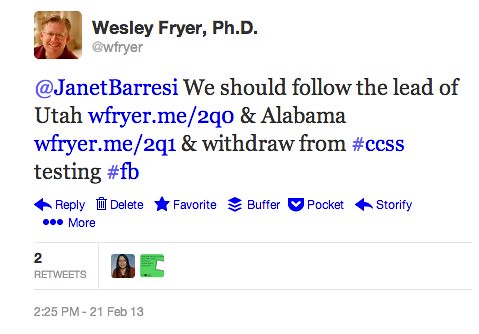
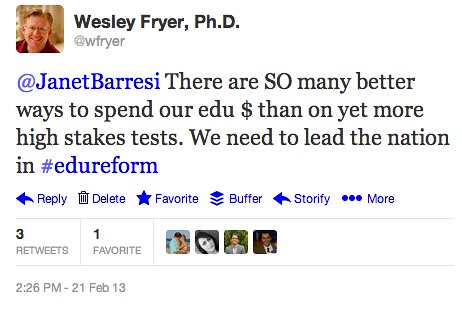
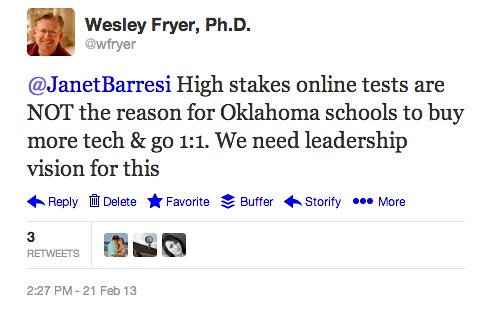
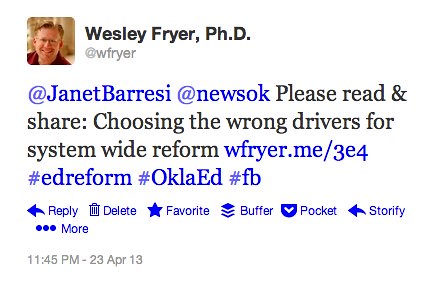
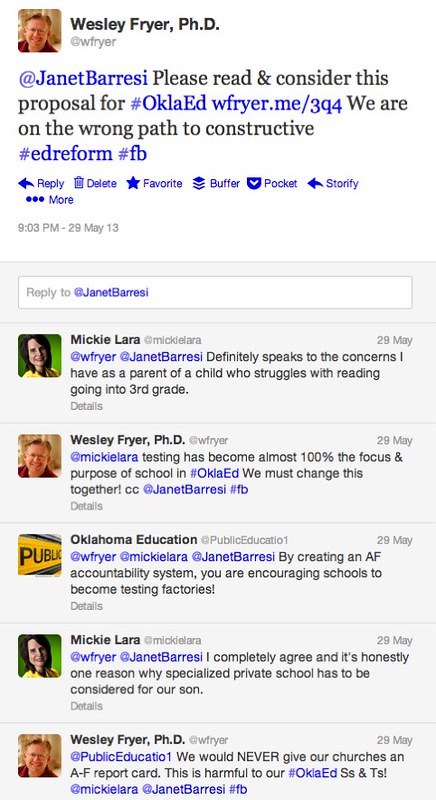
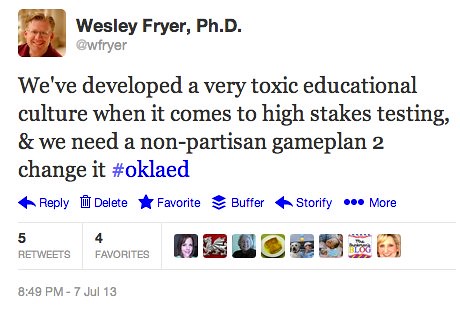
Comments
One response to “Hallelujah: Oklahoma Withdraws from Common Core PARCC Testing Consortium”
I am an EDM310 student from the University of South Alabama. I am going
into my second year at the College of Education. I enjoyed learning from
this post, but what are ways I can better chose which school system
fits my teaching style? Thank you and my blog is here.